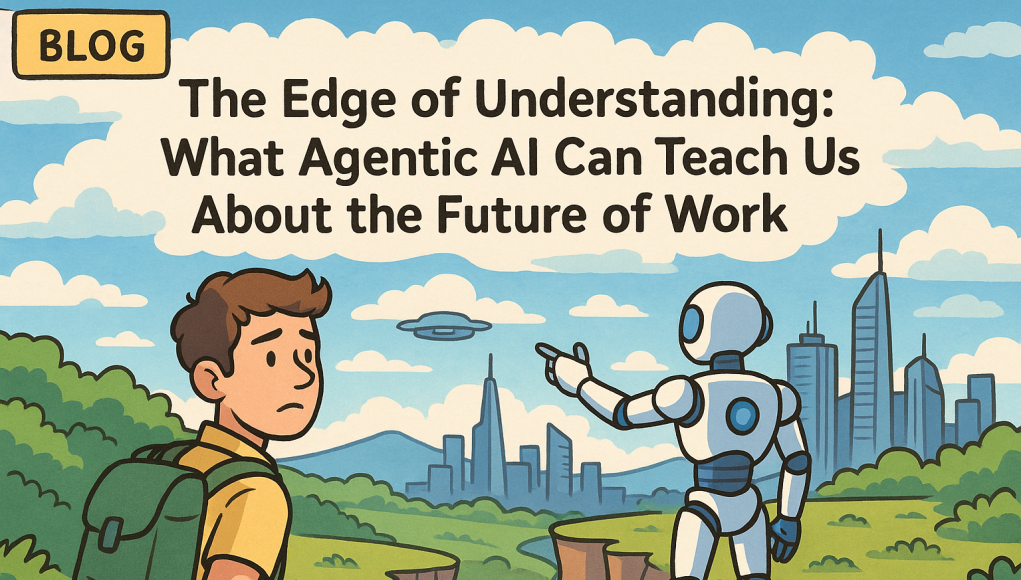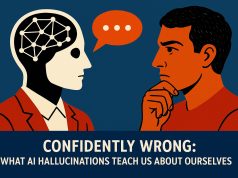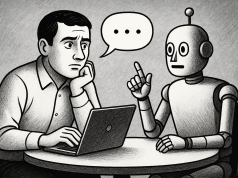It starts, as most revolutions do, with a whisper.
In the quiet corners of forests, under the hum of server farms, and now in the digital corridors of our workplaces, a transformation is taking shape. Much like the leafcutter ants of the Amazon rainforest—who cultivate food not for themselves alone but for the collective good—we are beginning to see a new species of intelligence emerge. Not artificial. Not merely synthetic. But agentic.
To understand where the future of work is headed, we must first understand how intelligence is changing its shape.
From Central Brains to Peripheral Wisdom
For decades, we’ve built AI the way we built cities: with central planning, tall towers of compute, and data piped in from the outskirts. These large language models—the towering “cathedrals” of synthetic intelligence—were trained on vast swaths of human knowledge, yet remained distanced from where the real action happened: the edge.
But something subtle, and arguably more profound, is now underway. Agentic AI is redefining the paradigm. These are smaller, more nimble models, tuned to context, embedded within workflows, and trained in situ. They are learning not only the “what” and “how,” but crucially, the why—interpreting human goals, intentions, and emotions in real time.
They are, for lack of a better term, workplace-native intelligences.
Language as the New Operating System
Language, for humans, is more than a tool—it is how we encode values, transmit culture, and negotiate power. For these new agentic systems, language isn’t just input—it’s interface, infrastructure, and insight.
In edge learning environments, these systems evolve with their human collaborators. They don’t just answer questions; they infer needs. They learn local dialects of work: how one team’s definition of “done” differs from another’s, how urgency is signaled in Slack vs. Zoom, how decisions emerge from conversation rather than command.
This language-based learning mirrors a truth the best leaders already know: the future of work isn’t built on instructions—it’s built on interpretation.
And here lies the profound lesson: If our AI can learn to speak the subtle language of work, shouldn’t we also learn to listen—better, deeper, and more locally?
Reclaiming the Human Edge
Paradoxically, as AI systems move closer to human nuance, the future of work becomes more human, not less.
Why?
Because agentic AI doesn’t replace creativity, empathy, or judgment—it magnifies them. By taking over the brittle mechanics of knowledge retrieval and coordination, these systems free up space for what we might call compassionate cognition—the uniquely human ability to hold tension, navigate ambiguity, and build meaning together.
In this world, the role of the worker evolves from executor to orchestrator. From task-doer to context-holder. And it places renewed importance on a type of intelligence we’ve long undervalued in corporate settings: emotional fluency, narrative thinking, and community sense-making.
Worker1: An Agentic Human Vision
At TAO.ai, we’ve championed a vision we call Worker1—a compassionate, high-performing professional who thrives personally and uplifts others. Agentic AI is a crucial ally in this journey. It supports the Worker1 not by directing them, but by adapting to them—learning from their habits, honoring their culture, and helping them grow in a way that’s deeply human and uniquely local.
In a sense, we’re not building technology. We’re cultivating ecosystems. Like the ants, we are tending to something larger than ourselves.
Closing Thought: What Will We Choose to Amplify?
Rachel Carson, in Silent Spring, warned us about the costs of ignoring the subtle signals of our environment. Today, those signals are digital—whispers in data, language, and behavior. The question isn’t whether AI will reshape work. It’s whether we will choose to use it to amplify our best selves or our most efficient shadows.
Agentic AI offers a choice: not between humans and machines, but between extraction and emergence.
Let us choose emergence.
Let us build a future of work where intelligence is not just synthetic—but symbiotic.



























![From TAOLabs: A New, Simplified Way to Learn in the Age of Chaos [30m60h90d] From TAOLabs: A New, Simplified Way to Learn in the Age of Chaos](https://theworktimes.com/wp-content/uploads/2025/05/ChatGPT-Image-May-13-2025-01_11_22-AM-100x75.png)
